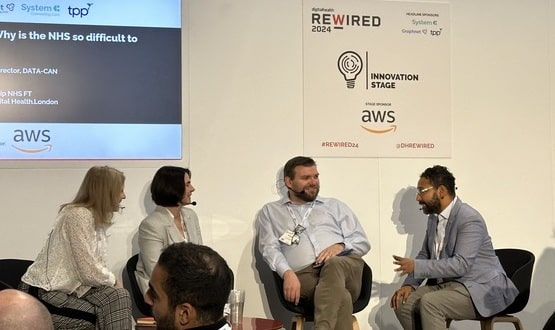FemTech and the NHS – we’re only just getting started
- 8 March 2021

As we celebrate International Women’s Day, Jenny Thomas, programme director for DigitalHealth.London and co-producer of FemTech TV, explores the role of FemTech in the NHS.
“I don’t think we talk about FemTech enough yet in the NHS…we’re only just getting started,” this is what an NHS obstetrician and gynecologist said to me recently and I could not agree more.
FemTech is short for Female Technology and refers to services, products and software which are created with a specific focus on women’s health. FemTech can be something as simple as period tracker apps but also represents a real opportunity for the NHS to make life saving and life changing improvements in care. Examples include earlier cervical and breast cancer detection, reducing the time to diagnosis for conditions like endometriosis and better treatment for adolescent girl mental health. There are many in the NHS who like me are excited about the opportunities for technology to be a force for good, but there is a growing number who recognise the specific opportunities that now exist through FemTech.
Employee wellbeing
Almost 80 percent of the NHS workforce is female and employee wellbeing was recently identified by the secretary of state for health and social care as key to our recovery.
FemTech offers solutions not just for patients but for our NHS staff too. Peppy Health is an example of digital technology that supports women going through life transitions like becoming a parent and the menopause. It connects women to relevant expert practitioners, one-to-one support, group forums, webinars and other content, at a time and in a format that suits them. A pilot of Peppy at NHS England showed that over 55% of participants had taken time off work due to menopause symptoms and 90% said their menopause symptoms became less bothersome following support from Peppy. Peppy have equally shown the impact they can have on female employee well-being through their partnerships with several large UK employers such as Santander and Wickes.
Peppy Health also took part in the NHS TechForce19 challenge and demonstrated their innovation improves the mental health of new parents, as well as, breast-feeding continuation rates, particularly for BAME and lower income families. This is a fantastic case study of how digital can support women with the greatest need.
There are many other great examples of where FemTech is currently being used in the NHS. The Elvie Trainer helps women strengthen the pelvic floor via simple and engaging five-minute workouts and it is available via the NHS supply chain. It can complement and support women’s physio in an easy to use every-day way.
Healthy.io’s founder Yonatan Adiri had a vision to turn the smartphone camera into a medical device and introduce the concept of the Medical Selfie. By combining a urine sample kit and testing strips with colour recognition, computer vision and artificial intelligence (AI) Healthy.io have rewritten the female urinary tract infection (UTI) pathway. Now women in many parts of the UK can complete urine tests themselves and get diagnosed and treated at home, reducing trips to the GP and pharmacy, whilst saving GP time and the NHS money.
Recovering from the pandemic
The role FemTech could play in the NHS’ recovery from the pandemic could change many processes and care pathways in the future. Particularly when it comes to supporting women on what are now potentially much longer waiting lists than before. Frendo is an example of this, an endometriosis app which helps women with information and support when they feel overwhelmed and isolated waiting for a diagnosis. Or Perla Health who are on a mission to redesign the Polycystic Ovary Syndrome (PCOS) pathway and have a huge amount to offer women through digital technology pre and post diagnosis.
National Voices are currently convening great discussions to convey what care is really like for patients to NHS decision makers. Two of their focus areas are the experience of patients waiting for care and the need for inclusion and co-design to be at the heart of the digital health agenda.
By listening more to women we’ll not only learn about problems that could potentially be resolved through digital, but we’ll also anticipate new problems that could be caused by digital. An instance of this that is particularly relevant to women could be whether remote consultations make it more difficult to spot safe-guarding concerns.
Training on and greater public awareness of the secret domestic hand signal hand for teleconsultations may help. Equally it’s important to give all patients, including women as they are often the coordinator of family healthcare, the choice, on how they want to access care in the future.
I’d urge anyone working in the NHS to see International Women’s Day as a moment to reflect on women’s health and the opportunities of FemTech to improve health and care for women.




